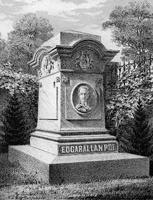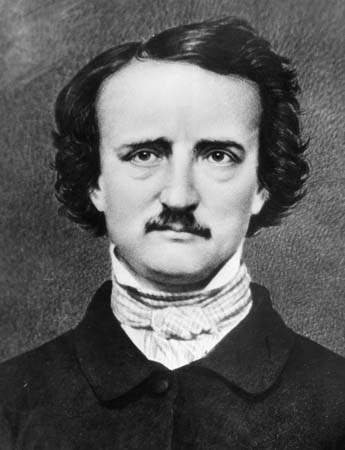January 19: Edgar Allan Poe
Edgar Allan Poe (1809)
It was on this date, January 19, 1809, that American poet and short story writer Edgar Allan Poe was born Edgar Poe in Boston, Massachusetts, the son of itinerant actors who died within two years. Edgar was reared in Richmond, Virginia, by merchant John Allan, from whom Poe took his middle name.
Poe showed great poetic skill from a young age. His first collection, Tales of the Grotesque and Arabesque — which included "The Fall of the House of Usher" — appeared in 1840, and by 1845 Poe became an established man of letters when his Raven and Other Poems was published. He did not dwell on his Agnosticism in his writings. Poe's biographer, G.E. Woodbery, says that "the only mention of his religion in his entire life is that the Bible was read to him when he was dying."*
Poe himself, in his prose-poem "Eureka," published the year before he died, says "... 'God,' ... stands for the possible attempt at an impossible conception."** He did not believe in life after death. Poe was found one day in Baltimore, unconscious in a gutter, and died on 7 October 1849.
* George Edward Woodberry, Life of Edgar Allan Poe, 2 vols., 1809, II, 345. ** Edgar Allan Poe, "Eureka- A Prose Poem" (dedicated to Alexander von Humboldt), 1848. You can read the full text at this link. The quote, “All religion, my friend, is simply evolved out of fraud, fear, greed imagination and poetry,” first appeared in a Poe biography published by Col. J.A. Joyce. Poe scholars consider the biography unreliable and the (admittedly second-hand) quote doubtful.(Updated 7/20/2020)
Originally published January 2004.
The Poe Toaster (from Baltimore.org)
 Beginning in about 1949, and repeating each year on the night of the anniversary of Poe’s birth on January 19, a mysterious stranger enters this cemetery and leaves as tribute a partial bottle of cognac and three red roses on Poe’s grave. The identity of the stranger, referred to affectionately as the “Poe Toaster,” is unknown. The significance of cognac is uncertain, as is does not appear in Poe’s works as would, for example, amontillado. The presumption for the three roses is that they represent the three persons whose remains are beneath the monument: Poe, his mother-in-law, and his wife. Out of respect, no attempt was ever made to stop or hinder him. After a brief pause from 2009, the tradition was revived in 2015.
Beginning in about 1949, and repeating each year on the night of the anniversary of Poe’s birth on January 19, a mysterious stranger enters this cemetery and leaves as tribute a partial bottle of cognac and three red roses on Poe’s grave. The identity of the stranger, referred to affectionately as the “Poe Toaster,” is unknown. The significance of cognac is uncertain, as is does not appear in Poe’s works as would, for example, amontillado. The presumption for the three roses is that they represent the three persons whose remains are beneath the monument: Poe, his mother-in-law, and his wife. Out of respect, no attempt was ever made to stop or hinder him. After a brief pause from 2009, the tradition was revived in 2015.


